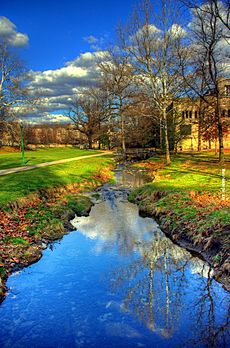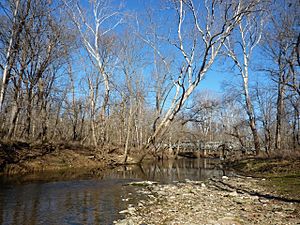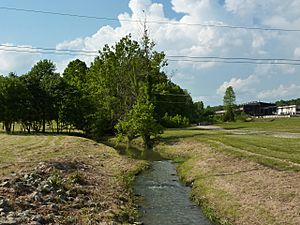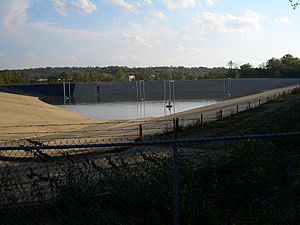Clear Creek (Salt Creek tributary) facts for kids
Clear Creek is a creek in Monroe County, Indiana, in the United States. It flows mostly southwest and south. Clear Creek is a branch of Salt Creek. Salt Creek then flows into the East Fork of Indiana's White River.
Clear Creek drains about two-thirds of the city of Bloomington. This means most of the city's rainwater and runoff flows into Clear Creek. The northern part of Bloomington drains into Griffy Lake and Beanblossom Creek. Clear Creek flows through the campus of Indiana University. On campus, people call it the Jordan River. It was named after David Starr Jordan, who was once the president of Indiana University. He later became president of Stanford.
Clear Creek goes through downtown Bloomington using underground pipes. It comes back to the surface near the southern edge of downtown. From there, it flows south through the lower half of Bloomington. After leaving the city, the creek flows through Clear Creek Town and Clear Creek Township. These places are named after the creek. Even though it shares a name, Clear Creek Town is not in Clear Creek Township. It is in the nearby Perry Township.
Clear Creek joins Salt Creek near the southern border of Monroe County. This is south of Harrodsburg. It is also a short distance downstream from the dam of Lake Monroe (38°59′40″N 86°30′49″W / 38.99444°N 86.51361°W).
Branches of Clear Creek
Clear Creek has a few main branches, also called tributaries. These include Jackson Creek, Sinking Creek, and West Fork Clear Creek.
Jackson Creek
Jackson Creek collects water from the southeastern part of Bloomington.
West Fork Clear Creek
West Fork Clear Creek flows along the western side of Bloomington. It joins the "main" Clear Creek on the south side of the city. In the early 1900s, a dam was built on West Fork Clear Creek. This created a small lake called Wapehani Lake or Weimer Lake. The lake was first used to supply water to Bloomington. However, it is no longer used for this purpose. Two much larger lakes, Lake Monroe and Lake Lemon, now provide Bloomington's water.
Today, the area around Wapehani Lake is a place for mountain biking called Wapehani Mountain Bike Park. The dam was taken down in 2018, and the lake was drained.
The Clear Creek Trail in Bloomington follows the West Fork Clear Creek. The trail that follows the "main" Clear Creek is called the B-Line Trail (the northern, paved part) and the Bloomington Rail Trail (the southern, unpaved part). The Bloomington Rail Trail crosses the West Fork Clear Creek on a 150-foot-long iron bridge. This bridge was first built in Warren County in 1887. It was moved and put in its current spot (39°6′30″N 86°32′35″W / 39.10833°N 86.54306°W) on August 1, 2003.
Sinking Creek
Sinking Creek does not flow into Clear Creek on the surface all the way. Instead, its water goes underground in an area west of Bloomington. This area is known for its karst terrain, where water can easily disappear into the ground. The water then comes out again in several springs. These springs are in an area called Leonard Springs and Shirley Springs. A reservoir, the Leonard Springs Reservoir, existed in that area from 1915 to 1943.
Water Quality
Clear Creek receives water from a few sources. One is runoff from Bloomington's streets, which can carry pollutants. It also receives treated water from the city's Dillman Road Wastewater Treatment Plant. This plant cleans wastewater before it is released into the creek.
In 1978, scientists from the CDC found a new type of bacteria in a water sample. This sample was taken from the "Jordan River" in front of the Indiana Memorial Union. They named the bacteria Legionella jordanis after the river. Later, this same bacteria was found in other places across the country.
 | May Edward Chinn |
 | Rebecca Cole |
 | Alexa Canady |
 | Dorothy Lavinia Brown |






